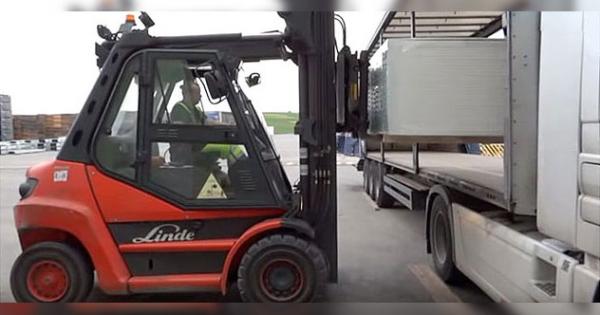
Spending weekly rest spent in the vehicle is not good for business
The European Transport Workers’ Federation, in its open letter published on 9 April and addressed to members of the European Parliament says it will not support any compromise to the core rules of driving and rest time included in the Mobility Package.
Some MEPs have suggested a reasonable legal solution in the form of a derogation for regular weekly rest in the lorry in the absence of suitable infrastructure. However, the ETF believes that allowing drivers spend weekly rest periods in trucks will lead to more unfair competition in the sector, and will come in full contradiction with the definition of rest.

New rules for cargo securing in Spain
The regulation, due to come into effect on 20 May, will impose new cargo securing obligations on hauliers.
The rules will apply to all vehicles travelling at speeds over 25 kph. Inspectors will have the right to check if the cargo is properly secured to ensure it does not pose a threat to road safety, property, health or natural environment. Inspectors will be allowed to conduct tests to check the cargo’s stability during various maneuvers.

Przedłużenie kontroli granicznych w Niemczech
Decyzja ta została podjęta w związku z kryzysem migracyjnym.
Rząd federalny zatwierdził przedłużenie kontroli granicznych między Niemcami a Austrią na kolejne 6 miesięcy.
Aktualnie, oprócz Niemiec, kontrole graniczne wewnątrz strefy Schengen prowadzi Austria, Francja, Dania, Szwecja oraz Norwegia, która nie należy do UE.

Germany extends some border controls for another 6 months
The decision is motivated by ‘a considerable amount of illegal migration’ and the heightened security situation in Europe following several attacks in recent years.
The authorities will continue controls along the German-Austrian border and on flights coming in from Greece.
At present border controls within the Schengen Area are also carried out by Austria, France, Denmark, Sweden and Norway, which a non-EU country.

The Czech Republic: the bridge near Pasohlávky closed to lorries
The bridge is part of a busy road from Brno to Vienna.
At present the restriction will apply to HGVs with a gross weight of 13 t. Next year the bridge will be closed completely.
Traffic is diverted through the towns of Břeclav and Znojmo.

Spain to fine drivers taking their weekly rest in the cab
The revised Spanish Law for Road Transport (LOTT) takes effect on the 1st of July.
The ban on taking the normal weekly rest in the cab will mainly affect drivers of foreign transport companies, which provide services in Spain, since Spanish drivers usually take their weekly break in their own homes.
The level of the offence (light, serious or very serious) and the amount of fine will depend on the number of hours that a driver spent in the cab in violation of the rules.

Italy – fine for taking weekly rest in the cab
Based on the ruling of the European Court of Justice of 20 December 2017, on 30 April the Italian Ministry of Internal Affairs issued a memo, which provides for the possibility of fining drivers who take their regular weekly rest in the vehicle.
According to the memo, such cases will be treated as a failure to comply with the regulation. Fines can range from 425 to 1701 euro.

France: van drivers are now obliged to log their driving and rest times
So far van drivers in France have not had to keep track of their driving times. But this has changed.
The government has issued guidelines for a number of inspection agencies, such as Direccte (Work Inspectorate), DREAL (Regional Department of the Environment, Planning and Housing), the police, the Gendarmerie and the customs service, enabling them to check if van drivers comply with the regulations.
From now on drivers of vehicles with GVW of up to 3.5 t are obliged to log their driving and rest times during their stay in France from the moment of entering the country to the moment of leaving it. This information has to be entered in a special driver’s log book.

Hiszpania: przez 5 lat odcinek drogi N-121-C w Nawarze zamknięty dla ciężarówek
Taką decyzję ogłosił rząd prowincji Nawarry. Zakaz ruchu będzie obowiązywał pojazdy ciężarowe o 4 lub większej liczbie osi na odcinku drogi krajowej N-121-C (Tudela-Tarazona) w kierunku południowym, pomiędzy skrzyżowaniem z A-68 w Tudela oraz skrzyżowaniem z AP-68.
W ramach zarządzenia przyjętego przez rząd Nawarry udostępniony zostanie nowy dojazd do autostrady AP-15 z drogi A-68, umożliwiający ruch w kierunku Logroño autostradą AP-68. Przejazd tą alternatywą trasą, która jest szybsza i bezpieczniejsza niż aktualne połączenie przez N-121-C, będzie zwolniony z opłat, na mocy umowy zawartej przez rząd z firmą Audenasa, koncesjonariuszem AP-15, której szacowane koszty wyniosą 802,000 euro do roku 2029.

Spain: section of N-121-C in Navarra to be closed to HGV traffic for 5 years
The decision has been announced by the government of the Navarra autonomous province. The ban will apply to HGVs with 4 or more axes on the south-bound section of the N-121-C road (Tudela-Tarazona), between the junction with A-68 in Tudela and the junction with AP-68.
As part of the measure adopted by the authorities of Navarra, there will be a new access route connecting A-68 with the A-15 motorway, which will enable traffic in the direction of Logroño along the AP-68 motorway. The use of the alternative route, which is faster and safer than the present one via N-121-C, will be free of charge by virtue of an agreement with Audenasa, the operator of AP-15, which is estimated to cost 802000 euro by 2029.